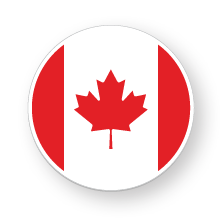 Canada
Canada
With inflation firmly within its target range, the Bank of Canada (BoC) reduced borrowing costs this December for the fifth time this year by cutting its benchmark rate by another outsized fifty basis points, bringing it to 3.25% to close out 2024 from 5% where it started. The cuts not only signal the BoC’s view that the recent surge in inflation has been tamed, but also that the Canadian economy continues to register only meagre growth. With December's unemployment rate at 6.7%, and real wage growth moderating, consumer spending remained subdued. With the imminent threat of tariffs on Canadian exports to the U.S. from the incoming Trump administration, and a still uncertain global economic outlook for 2025, the year ahead is likely to be a challenging one. While falling interest rates have helped bring down bond yields, continued economic and geopolitical anxiety has slowed their fall. Equity markets rallied in 2024, driven by gains in Financials, Consumer Staples and Information Technology sector stocks.
 United States
United States
Continuing to defy the odds and the pundits, the U.S. economy maintained its momentum through 2024, ending the year with solid GDP and employment results. However, while inflation has fallen sharply from its recent highs and continues to trend in the right direction, its recent spikes higher have raised concerns that the U.S. Federal Reserve may not have completely reined in price pressures. Despite its outsized half-a-percent-cut in August, and the follow-up quarter point cuts in November and December, interest rates remain high and restrictive. With the incoming Trump administration’s threatened trade tariffs and proposed tax cuts and higher spending, markets ended 2024 on a tepid note. However, this did little to dampen what has been an outstanding year for U.S. equity markets, and Information Technology stocks continued to lead the way.
 Europe
Europe
Faced with a weak economy that is expected to end 2024 with less than 1% GDP growth, Europe’s central bank once again cut interest rates in December in the hopes of spurring spending and investment. However, the outlook for the year ahead appears more optimistic, with a rebound in growth expected based on a stronger outlook for export markets in China and North America, and inflation continuing to fall while employment is seen as rising. Germany and France have both seen upheaval on the political front. Along with a change in government in the U.K. in 2024, the region is poised for an uncertain 2025, complicated further by the new Trump administration’s tariff threats, and the ongoing war between Ukraine and Russia. European stock exchanges have experienced solid if mixed returns in comparison to their North American counterparts, driven by technology and financial services stocks.
 Emerging Markets
Emerging Markets
China continues to try to kickstart its flagging economy, with monetary and fiscal policies proving to be largely ineffective in 2024. While Emerging Markets (EM) countries began the year with hopes that the high U.S. dollar would ease, the mighty “greenback” continues to punish these countries, especially those with high debt levels in U.S. dollars. Fears of tariffs from the incoming Trump administration are also working to cloud the outlook for the EMs. Deeply discounted valuations, falling inflation, and the hope of easing monetary policy in the developed world should help EM equities in 2025, with a hoped for weakening U.S. dollar providing a boost to EM fixed income.
For more insights on the global economy and markets, please refer to RBC Global Asset Management’s Global Investment Outlook – Winter 2025.
Past performance is not indicative of future results. Counsellor Quarterly has been prepared for use by RBC Phillips, Hager & North Investment Counsel Inc. (RBC PH&N IC). The information in this document is based on data that we believe is accurate, but we do not represent that it is accurate or complete and it should not be relied upon as such. Persons or publications quoted do not necessarily represent the corporate opinion of RBC PH&N IC. This information is not investment advice and should only be used in conjunction with a discussion with your RBC PH&N IC Investment Counsellor. This will ensure that your own circumstances have been considered properly and that action is taken on the latest information available. Neither RBC PH&N IC, nor any of its affiliates, nor any other person accepts any liability whatsoever for any direct or consequential loss arising from any use of this report or the information contained herein. This document is for information purposes only and should not be construed as offering tax or legal advice. Individuals should consult with qualified tax and legal advisors before taking any action based upon the information contained in this document. Some of the products or services mentioned may not be available from RBC PH&N IC; however, they may be offered through RBC partners. Contact your Investment Counsellor if you would like a referral to one of our RBC partners that offers the products or services discussed. RBC PH&N IC, RBC Global Asset Management Inc., RBC Private Counsel (USA) Inc., Royal Trust Corporation of Canada, The Royal Trust Company, RBC Dominion Securities Inc. and Royal Bank of Canada are all separate corporate entities that are affiliated. Members of the RBC Wealth Management Services Team are employees of RBC Dominion Securities Inc. RBC PH&N IC is a member company of RBC Wealth Management, a business segment of Royal Bank of Canada. ® / ™ Trademark(s) of Royal Bank of Canada. RBC, RBC Wealth Management and RBC Dominion Securities are registered trademarks of Royal Bank of Canada. Used under licence. © RBC Phillips, Hager & North Investment Counsel Inc. 2025. All rights reserved.
